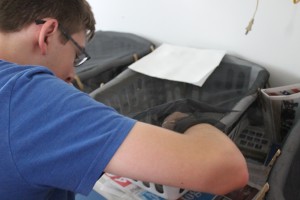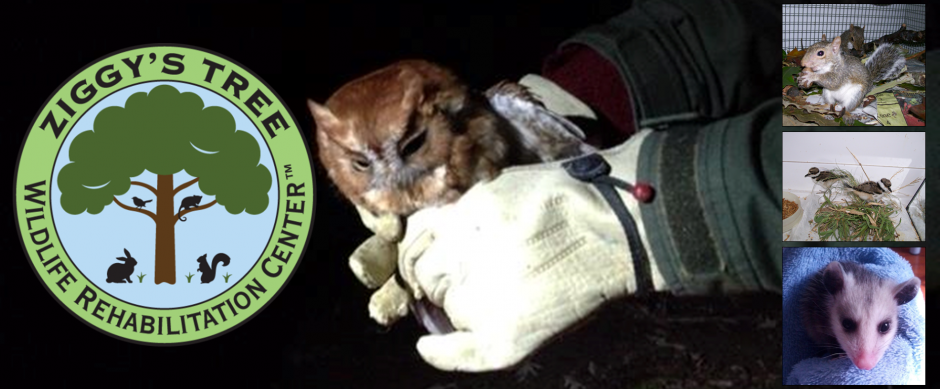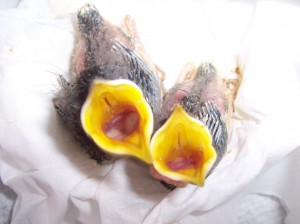 Here at Ziggy’s Tree we are always looking for volunteers. You’ll have a chance to learn about our native wildlife along with all the daily tasks that must be done.
Here at Ziggy’s Tree we are always looking for volunteers. You’ll have a chance to learn about our native wildlife along with all the daily tasks that must be done.
There are many different ways to help out:
- You can get the chance to hand-feed baby animals
- You can drive animals to their release area, and get the chance to witness a creature reunite with their home
- You can help raise the awareness of this organization
- You can help clean up our rehabilitation areas
- You can host fundraisers
If you are interested in any of these, please complete our Volunteer Application and Ziggy’s Tree Volunteer Waiver and e-mail them to us at ziggystreewildlife@gmail.com! You’ll be glad you did!
Please read the following for more information on volunteering on our animal care team.
Animal Care Volunteer Requirements
- Volunteers working directly with wildlife must be at least 18 years of age.
- Volunteers must be able to lift 25 lbs, comfortably reach arms above your head, be able to stand for up to 4 hours on hard surfaces, and have good visual acuity and hand dexterity (many of our babies have small mouths).
- Volunteers working directly with wildlife must commit to a 4-hour shift a week. Baby mammal season typically runs February through May and July through October. Baby bird season typically runs mid-April through September.
- Volunteers should be prepared to have fun, get dirty, follow instructions for safe and effective animal care, and learn a lot!
We Depend On Our Volunteers
We ask potential volunteers to seriously evaluate their schedules and other commitments before they join our volunteer team. Our organization is 100% volunteer driven and our patients depend on us for their food, housing and medical needs. Volunteers are expected to attend their scheduled shift every week, and missing a scheduled shift has a significant impact.
It is a dirty job! Our work is tedious, messy and often physically demanding. Most tasks involve cleaning, carrying things, bending down, and being on your feet for the duration of your shift. If you’re squeamish (you might have to handle live insects or chop up meat) or don’t like cleaning, this is not the volunteer opportunity for you.
We are not Snow Whites! We are working with wildlife and respect their wildness. We work to assure that they will be productive members of their species after release. This means we do not cuddle or talk to our patients. If you’re seeking an opportunity to connect with and cuddle animals, please consider volunteering at a domestic animal rescue.
Health and Safety
Volunteering with wildlife involves some inherent health risks and we are committed to minimizing or eliminating these risks. Protective clothing such as gloves, eye protection and face masks is required when conducting certain tasks around our patients. We are also currently working with recommended CDC/COVID safety practices. Volunteers who do not follow proper safety precautions while on duty will be asked to leave our program.
- It is recommended that people with compromised immune systems do not volunteer in wildlife rehabilitation.
- We recommend that anyone volunteering with us inform their regular doctor that they are working with wildlife.
- We recommend you have a current tetanus vaccination.
- If you are pregnant, we will not be able to accept you as an animal care volunteer, but we we’ll be glad to talk to you about other volunteer opportunities such as fundraising or administrative tasks.
Zoonotic Diseases
All animals can carry, contract and spread various diseases, and the wildlife we handle is no exception. Although many diseases are species-specific, some may be transferred between species and to us. Diseases we can contract from animals are called zoonotic diseases or zoonoses. Zoonoses are a concern in wildlife rehabilitation, however proper hygiene (washing hands before and after handling animals, eating, or using the bathroom) and proper safety techniques (wearing gloves or masks as required) greatly minimize risk.
Volunteers with Pets
Some diseases that are not transmittable to us may be a danger to pets. Potentially sick wild animals must never come in contact with domestic animals. To keep risk of exposure to you and your pets, we recommend the following:
- Keep a separate set of clothes and shoes for volunteering. After working a shift, remember to change out of your clothes before going into pet occupied areas of your house.
- Volunteers with pet birds should be especially cautious as some avian conditions may be more easily transmitted between our songbird patients and pet birds. Wash hands frequently and well, and change clothes before handling pet birds. Be sure to inform us if you have pet birds so that your contact with contagious patients can be minimized.
Clothing
Volunteers are required to wear closed-toe shoes at all times. Other clothing guidelines are at the volunteer’s discretion, but always wear something you do not mind getting dirty! Volunteering can be very hard on clothing. Trust us, one of our patients is going to pee or poop on you at some point!


